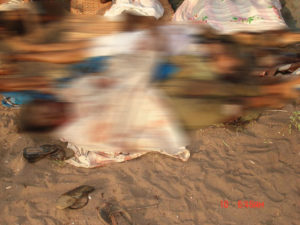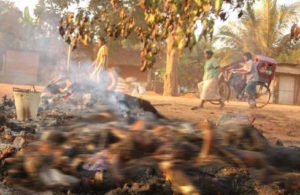The civil war in Sri Lanka opposed, officially from 1983 to 2009, the government of Sri Lanka dominated by the Sinhalese Buddhist majority, and the Liberation Tigers of Tamil Ilam (LTTE), a separatist organization fighting for the creation of Tamil Eelam, an independent state in the east and north of the country, mainly populated by Tamils of Hindu religion (18% of the country’s population).
This civil war was very costly in human lives, killing more than 80,000 people including 27,639 Tamil tigers, 21,066 Sri Lankan soldiers, 1,000 Sri Lankan police, 1,500 Indian soldiers and tens of thousands of civilians, mainly Tamils.
From January 20 to March 31, 2009, 78% of civilian deaths took place in the ceasefire zone mainly composed of Tamils. The government rejects the call for a ceasefire and decimates hundreds of people a day for several months. In total between 40,000 and 70,000 Tamil civilians, including children, were killed, thrown into hot tar, gutted, smashed against walls and raped. Over 150,000 people were left homeless overnight. Tamil properties were ransacked and burned.
In addition, in 2009 the government had used chemical weapons such as white phosphorus, or even clusters (defragmentation munitions) weapons which were prohibited by the Geneva Convention after the Second World War. By using these weapons, the intention of the government was to mass kill the Tamil population.
On this day, Tamils living in the North East of the country continue to suffer human rights violations and genocide is still happening in different forms.
The ongoing genocide of Tamils today is carried out through brutal military occupation and a deliberate program of Sinhalese colonization. The army controls all aspects of individual, social and professional life and the military occupation threatens the safety and security of Tamils.
Sri Lanka’s refusal to take concrete action to address serious violations of human rights and international humanitarian law means that the only way to determine the facts and identify those responsible is through an independent and impartial investigation. be ordered by the Security Council, and that those responsible be brought before the International Criminal Court. It would also be appropriate for the UN to protect the Tamil people from the acts of barbarism commonly practiced by the Sri Lankan government on the Tamil people and so that the right of self-determination of the Tamil people is recognized and respected.
Centre Zagros pour les Droits de l’Homme ( Zagros Human Rights Center )
May 18, 2022
——————————-
Here are some photos to remember this crime. However, we filtered the images because our page is visible to public. We pay tribute to the victims of this massacre.

